
(Previous entries: 100-76, 75-51, 50-26 )
We're in the home-stretch now. Closing in on the Top 10 of the past decade!
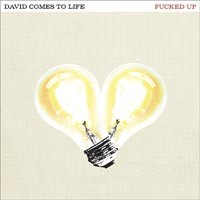
25. Fucked Up - David Comes to Life (2011)
Fucked Up embraced their story-telling prowess and introduced David Eliade to the world on 2011’s rock opera David Comes to Life. This album presented a complex meta-narrative complete with misdirection and unreliable narrators, all told in four acts.
The ideas of love, loss, self-discovery, and redemption were central on David Comes to Life. The lyrics switched perspectives between characters and wove intricate plot webs that left listeners constantly trying to make sense of it all. The band also allowed themselves to become a part of the characters, incorporating what was going on in their lives into the lyrics. This gave the album a more personal feel and offered another level of connection to the music. The instrumentation on David Comes to Life sounded alive and vibrant, telling the story through a hardcore punk lens, lyrically and musically. Fucked Up were able to create a depth and feeling on each and every song that felt like you were in David’s world, trying to figure everything out along with the characters.
David Comes to Life pushed the boundaries of hardcore punk and solidified Fucked Up as a band that held nothing back when it came to creativity and hard work. Fucked Up showed that genre barriers and expectations were made to be broken and reinvented, because without fail something new and exciting would come out of it that people hadn’t considered before. David Comes to Life showed that creativity and out of the box thinking was alive and well in modern punk rock. -Em Moore
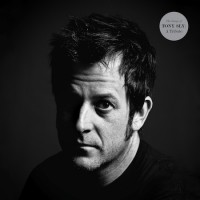
24. Various Artists - The Songs of Tony Sly: A Tribute (2013)
The sudden passing of Tony Sly in 2012 brought a wellspring of grief from the punk rock community. Honoring his love of music, the Tony Sly Music Foundation for Kids was established to promote music education in schools. Sly’s long-time label Fat Wreck Chords stepped up to the plate, coordinating and releasing a benefit album, the proceeds of which would go to the new foundation in Sly’s name. Featuring bands covering songs written by Sly throughout his career for his various acts, including No Use for A Name and his solo work, what resulted was 26 artists on the actual album, and 7 more on the digital download “bonus tracks” not only reimagining Sly’s songs in different ways, but paying tribute to a great presence in the scene. From Mad Caddies’ reggae-esque stylings to the infectious and unabashedly bluegrass Old Man Markley, the album is a testament to Sly’s song-writing and lyrics, proving that what he wrote could transcend the punk genre. It is still a pleasure to listen to so many years on, and reminds us of, not just Tony Sly, but all musicians and artists we have lost all too soon. -Jeff Sorley
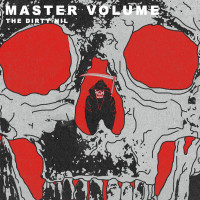
23. The Dirty Nil - Master Volume (2018)
In 2016, not long after the release of their debut album, Higher Power, the Dirty Nil’s original bassist and occasional singer, Dave Nardi, left the band. A little while after, the Dirty Nil hired Ross Miller as their new bassist and looked toward the future. Ross Miller was known around the Southern Ontario punk and rock scene, having played in many bands including Single Mothers, appearing on three EPs and on their 2017 full-length Our Pleasure. In 2018, the band released Master Volume, an album that marked the full-length debut of Ross Miller as part of the Dirty Nil and solidified their sound.
On Master Volume The Dirty Nil sounded clearer all around. They injected punk rock energy into songs that drew on their classic rock influences to create something wholly unique and their own. Every member played like they were on the same page, contributing to the overall sound without anyone trying to outshine anyone else and still left enough room for each person to add a touch of their personal style. The band sounded much more confident, cohesive, and solid. The bass sounded stronger and deeper, which contributed to the heavier, rockier, and more energetic feel of the album.
All throughout Master Volume, the growth of the Dirty Nil and the pride they took in creating the type of music that they wanted was apparent. The Dirty Nil built on and improved their sound with the addition of Ross Miller as their bassist. They unlocked their true potential and unleased their passion on Master Volume. Hail, hail rock n roll. -Em Moore

22. NOFX - Self / Entitled (2012)
Over the past several years NOFX has been as especially polarizing inside the punk community as they ever were outside of it. But through it all they keep chugging along, albeit maybe a bit slower with the output than in their younger days. On their first studio LP of the decade, Self / Entitled saw the band doing what they normally do, albeit with a little tweak here and there. While the album didn’t produce any stand-out hits, there is actually a lot going on, and most of it really good. Fans (and non-fans) can argue whether this is for good or ill, but the album feels very much like The Fat Mike Show. Songs such as “Cell Out” (Fat Mike is no longer punk) and “Sycophant” (Fat Mike being kowtowed to) and “I’ve Got One Jealous Again, Again” (Fat Mike’s divorce, which works great as a sequel to the 2003 ode to his marriage “We Got Two Jealous Agains”) expose a bit more of Fat Mike than we usually get on a NOFX album. But outside of those are also some really great tracks- one that really hits, “She Didn’t Lose Her Baby,” harkens back to the emotions evoked by “She’s Gone” (White Trash…, 1992) and is likely one of the most powerful tracks on the album by a mile. Does NOFX break any boundaries here? Maybe a few. But overall they stick to a formula wherein they make enjoyable music, which is enjoyable whether or not you like the band (or members of, or just Fat Mike) themselves, and have put together an album that is infinitely listenable. -Jeff Sorley
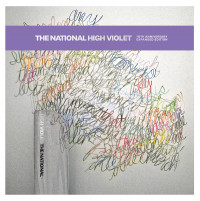
21. The National - High Violet (2010)
The National is certainly one of the least “punk” bands in pure sound as far as this feature goes, but they’ve long been a favorite of many a staff member and reader here. The New York-via-Ohio quintet (two pairs of brothers and dusky singer Matt Berninger) already had a rising profile upon this album’s lead-up, but they really seemed to explode upon the release of High Violet, and for good reason: It is a roundly captivating, deliberate examination of adulthood anxieties and insecurities, captured through a roomy, arresting indie rock/post-punk revival style that feels soul-baring at nearly every turn. One could hear echoes of classic acts old and new like Leonard Cohen, Interpol and Tindersticks on past efforts, but the National very much became their own band here, one with a compelling and, as far as modern indie rock goes, incredibly emotional sound. They could infuse the mood with a twist of sardonically upbeat flavor like on fan favorites “Bloodbuzz Ohio”, “Lemonworld” and “Conversation 16”, or rev up the gloomy, dour atmosphere on epics like “Sorrow”, the Sufjan Stevens-guested “Afraid of Everyone”, and the underappreciated “Little Faith”. Not to mention, the album had a genuinely profound impact on our little punk subculture from nearly top to bottom: It influenced the songwriting and, to one degree or another, musical direction of second-tier Fest acts like Touché Amoré, Pianos Become the Teeth, and Make Do and Mend, and even crept into lower-level, but no-less-ambitious post-hardcore/emo scenes. -Brian Shultz
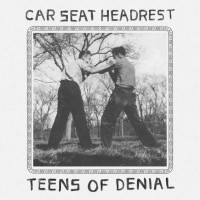
20. Car Seat Headrest - Teens of Denial
Refreshing indie rock band Car Seat Headrest packed a buzzy, no-shame collection of songs into 2015's Teens of Denial, covering over 70 minutes of dirty guitar hooks, perfect storytelling, and self reflection.
Singer/Guitarist Will Toledo noted that upon entering the writing phases of the album he "Wrote it during a period of my life where I was not feeling a lot of love," resulting in 12 grungy trust falls with no regrets. Toledo's Ocasek-pocketed vocals drip with honesty and no second-guesses, and the grimy, imperfect instrumentation it rests on simply seals the authenticity of the entire session.
Something CSH has a 100% success rate on is huge, banger bridges, and "Destroyed By Hippie Powers" is a significant example. That bridge out-stands the biggest build, on the most treasured moment of anyone's Pinkerton deep dive. Shit rips. "Single" and fan favorite track "Drunk Drivers/Killer Whales," resides directly in the middle of the LP and stands mighty, a 6+ minute build of it's own that crescendos so creatively, the listener would never know of the run time unless they checked.
The production to Teens is also incredibly charming, as it sounds like a home recording to the naked ear, yet the master carries as much back end and strength of any other punk album you may be blending between. The twangy guitars vibrate through every song, but never leave a bad taste in the listener's mouth, and the entourage of harmonies, keys, percussion, and horns ring crystal clear in the mix.
Teens of Denial is a tremendous gem, and while it is personal and wrapped with raw talent, it only takes itself seriously enough to be enjoyed, which is a great weight off of the listener, and a giant welcome back sign for those that return to visit Will Toledo's brain again and again. -Mike Elfers
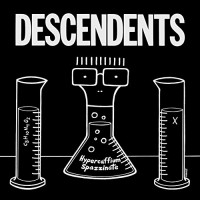
19. Descendents - Hypercaffium Spazzinate (2016)
Hypercaffium Spazzinate was the Descendents’ first album in 12 years when it came out in 2016 and despite the wait, it charted on Billboard, reaching a peak position of two almost a month after it was released. This proved that the community created by punk rock and the fanbase amassed by the Descendents in particular was exceptionally strong and withstood generations. The album also had a feeling of closeness and friendship that was present in every track. The Descendents sounded like they truly cared about one another and valued the bonds made stronger by the band.
Young people are either drawn into the music that their parents listened to or are repelled by it and set off on a quest to find music of their own. The Descendents started out making music that appealed to outcasts, nerdy kids, funny kids, kids that wanted a break from the hypermasculinity of the hardcore punk scene and showed that their music was still just as relevant today to young people just discovering them and people who have been with them from the beginning.
The Descendents united generations on Hypercaffium Spazzinate from dealing with toxic masculinity on “Testosterone” to the negative effects of fast food that come with aging on “No Fat Burger” to the over-medication of kids with attention disorders from a parent’s perspective on “Limiter” to supporting a friend through their illnesses pep-talk style on “Smile” and their triumphant recovery on “Comeback Kid”, there was something that anyone, regardless of their current stage of life, could relate to. -Em Moore
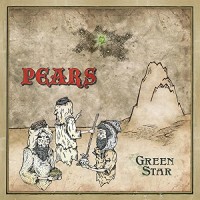
t17 PEARS - Green Star (2016)
What happens when one of the biggest DIY punk success stories in recent memory now has the backing of a record label? If you just happen to be PEARS, you double down on exactly what got you there.
Like their debut Go To Prison, Green Star refused to be pigeonholed. Is it street punk? Is it hardcore? Is it thrash? PEARS broke out of the pigeonhole and then left it burning behind them. At the core of the record, the arrangements themselves defy and defile; constantly changing up chord progressions and rhythms, mirroring the nihilistic lyrics. Whereas many bands who experiment with different genres throughout the course of a record, PEARS will take the shifting moods within each song and change up the style then and there. And not just in the accompaniment. Singer Zach Quinn’s penchant for performance knows no restrictions. He can wail, scream, and carry a note, all with equal force. To achieve what Quinn can on vocal duties, most bands are likely to require multiple singers.
I don’t know if the unwritten rule of keeping punk songs short is still enforced, but PEARS doesn’t take any chances. Knocking out 16 tracks in under a half hour, they still crammed enough shifting textures onto Green Star to catch what you missed while you were blinking on the next spin.
If Go To Prison set the stage for a revolution, Green Star raised the flag. In 2016, there just wasn’t anything else that had the same spirit, attitude, intelligence, whimsy, and aggression of PEARS. -Chris DC

t17. The Menzingers – On the Impossible Past (2012)
If you asked me to pick my favorite track off of On the Impossible Past, I’m not really sure I can give you a definitive answer. If you asked me what my favorite moment is, I might be a little less indecisive in my response. Reason being, that’s really what this record is – a single, start-to-finish collection of soul-gripping and emotion-inducing moments. These moments, given your time and place, will elicit your own vivid memories and stimulate a flood of seesawing feelings that vary with each listen.
Conceptually, it was framed around nostalgia and the days of yesteryear. This wasn’t just a creative direction, but a subtle ode to the spirit of their hometown roots. For many years prior, the band embraced their Scranton foundation, delivering rusty, working-class punk rock that imitated life in northeastern Pennsylvania. Now, they were putting the personality and character of the once bustling coal-mining region on display. It’s an area that survives on the past, where memories maintain the pulse of everyday life. This kind of sentiment is what exudes from this, their monumental Epitaph Records debut. You may have never taken a ride in a muscle car, or fell in love with a waitress, but in the way that these heart-tugging narratives were delivered, you’d find yourself wandering down your own memory lane.
The moments from On the Impossible Past spark the biggest live responses still to this day. But those emphatic, “in-the-moment” reactions, all coming from a different place in the psyche of those singing along, end up just becoming part of the past.
After all, “happiness IS just a moment.” -Terry McGinty
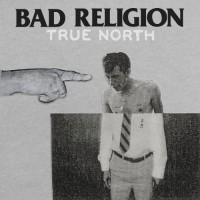
16. Bad Religion - True North 2013
There is a dry rub to Bad Religion's True North, released in 2013, that guides the album in a really great way, allowing familiar riffs and chord progressions to really stick out in their giant discography. The variance of squeaky-clean polish in the masters of everything from 2002's Process of Belief all the way to 2010's The Dissent Of Man is lifted, leaving a mix that is more raw and vintage.
The result is dirty, twangy guitars, and drums that sound like they do from behind the kit for once, and allows the 2013 release to relate sonically with albums like Suffer or No Control. The track listing follows the same traits; as the 16 punk rock songs, all averaging around two minutes, showcase what the legendary punk band does best.
There are a few out-of-the-norm tracks, that transition nicely between the BR classics. The slow vocal/guitar intro to "Past is Dead" is a nice switch flip, "Dharma and the Bomb" is fantastic, introducing pitted surf vibes, and "My Head is Full of Ghosts" features some of the only rapid-fire double kick from Brooks Wackerman, who, for whatever reason, significantly dialed the flashy stuff back on his last standard release ever with the band.
The farewell to Bad Religion's longest sitting drummer is bittersweet, and perhaps he kept it cool on his final session, easing into less impossibly complicated capabilities for his replacement. True North closes out with catchy hooks and optimism with the addicting "Changing Tide," easily one of the best songs on the album. As usual, great record. Greg, Brett, Jay and co could pump out releases like this for the rest of time and I would keep checking them out, plucking my favorites, and looking forward to the next. -Mike Elfers

15. David Bowie - Blackstar (2016)
How do I write about a legend’s last album, and one of his best and most unique of his career, in 150 words? The answer is I don’t--I go over the wordcount--and Jeff can deal with it. *Wink emoji* Wandering into a NYC jazz club, Bowie found the backing band for Blackstar, an LP with a release date that would predate his death by only two days. He wrote the entire record knowing he had limited time on this earth (whether he was even from this earth is debatable) which is incredible in itself, to have that drive while the life is slowly draining from your body is a feat. A folkie turned spaceman turned glam star turned avant garde studio trickster turned new waver turned whatever-else-he-wanted, Bowie then puts out a dark and intriguing jazz-rock album. What?? Backed by a jazz-trained drummer, bassist and tenor saxophonist, he folds the trio into his own vision for the tracks, which are more rock than jazz but with the musicians’ flavors intact throughout. Blackstar is best listened to in a dimly-lit smoky bar (do they still have those? I’d only tolerate cigarette smoke for Bowie, no one else), and I actually sang lead and played tenor sax on “Lazarus” in a smoky dive bar a few times while doing a tribute band I formed after he died. The difficulty of learning a 45-minute set of Bowie songs, with each one sounding different than the last, and “Lazarus” sounding one of the most different despite being from an “old guy Bowie” album, is a testament to his need to push himself artistically, even as he was dying. The music world is a less interesting place without him, and Blackstar was a fitting end to his career and his life, which was full of genre-line-crossing, to show him breaking ground as they were breaking ground at his gravesite. Greg Simpson
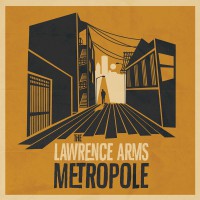
14. The Lawrence Arms - Metropole (2014)
This was the album I listened to more than any other album, according to ITunes and Spotify, in the most recent decade. And I’d have a hard time arguing with anyone who said Oh, Calcutta was a better album. For me though, this album crept up on me in the years after it came out and just connected with certain parts of who I was as a person and who I didn’t want to be any more as a person. I know when the album came out, “Seventeener (17th and 37th)” was my favorite track on the album. Perhaps it had something to do with feeling older than my peers, if only because I’d started making other lifestyle choices. I honestly don’t know. I do know when my mom got sick a few years later the album’s title track became a near daily listen, largely because of the lyric, “Mother I don’t even care, I thought I tried I’m so sorry I never call and I never write.” Now I’ve never lived more than a couple miles from my parents’ house but she was sick and I knew what her chances of long term survival were. I think I felt like there wasn’t anything as enough time at that point. Musically, this album is slower and more melodic. But, I think I really think the lyrics are what sucked me in. -Johnathon1069
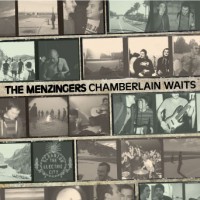
13. The Menzingers - Chamberlain Waits (2010)
Chamberlain Waits was really when The Menzingers second studio album, it was also where the really arrived as a band. Their debut did a lot of things right, and while some fans might disagree, they simply expanded on those things and added new elements here. Having listened to their entire discography, this was really the album where they found their sound. I feel like they also found themselves here, whereas on their debut the at times sounded almost indebted to some of their influences; here they sound like they recognize who they are but they also recognize themselves. For some fans, this album was the beginning of the end of them as it marked a more traditional sound in terms of songwriting. For me, that made the band more enduring. The band never stops being honest, about the world or where they feel they exist in it. That honesty is important, and can be felt whether a band is playing crust punk or more traditional pop music. I think that’s what makes this album so much more memorable than their debut, it’s honestly by I get the melodies stuck in my head and keep wanting to revisit them. The Menzingers seemed likely to take over the world from here, and if we’re being honest, that still do. -Johnathon1069
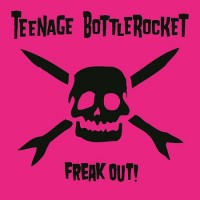
t11. Teenage Bottlerocket - Freak Out! 2012
Wyoming's Teenage Bottlerocket exploded on the scene in the early '00's with their own sneering classic skate punk rock, but the 2012 release of Freak Out! is what hoisted the four piece far beyond the Screeching Weasel records they grew up with.
Every element of Freak Out! sparkles in unison, from the hot pink album art, to the guitar tones and subject matter, and the seamless traded vocals, to a variation of tempos that always seem faster than the last. The 14 song full length reaches only 29 minutes, complete with TBR's own self-titled thesis, stapled to the first 0:39 of the record. Ray Carlisle and Kody Templeman's vocals were delivered and mixed in such a particular way that make them sound like the coolest fucking guys at a party you wished you were invited to, and the instrumentation of the four piece was solidified by the late Brandon Carlisle's lightning-pristine and obedient punk rock drumming.
The snotty punk themes about picking up women, Kiss armies, and horror section conventions, nestle perfectly against songs riddled with angst, relationships, and self reflection; all respectful to the 16th notes, cord progressions, and single string leads that define classic punk rock. TBR has a spectacular discography, and Freak Out! is one of the very best of the collection.
The album eases to a close with "Go With the Flow," perhaps the most honest moment on the record, and a victory lap to wind down the pitted roller coaster that proceeded. This record will always be a go-to for me. -Mike Elfers
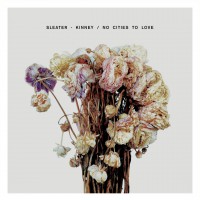
t11. Sleater Kinney- No Cities to Love (2015)
No Cities To Love came an entire decade after 2005’s bombastic, in-the-red, front-to-back banger LP The Woods. In the interim were solid albums from The Corin Tucker Band and a suuuuper rad project of drummer Janet Weiss and guitarist / co-vocalist / songwriter Carrie Brownstein (plus Mary Timony and Rebecca Cole, who both rock hard) called Wild Flag, who put out an amazing self-titled record that should be on this list too… but I digress. Oh and Brownstein was on some such TV show. So finally Sleater-Kinney returned to us: Tucker and Brownstein decided they could work together again, and I don’t really know the details there, but the world thanks them for patching it up and it seems like they didn’t miss a beat as co-vocalists, co-songwriters or companion guitarists. No Cities To Love hopped back past the hair-blowing-back volume of Dave Fridmann’s production on The Woods (which I loved, please note) to the more trebley, spindly, anxious production of classics Dig Me Out and All Hands on the Bad One. That jitteriness, that half-melodic, half-yelped style of Tucker’s voice and the sassy punch of Brownstein’s is what makes all their albums captivating, and this album is slathered in fantastic vocal performances. Opener “Price Tag” blows the record open immediately, and two years later Live in Paris opens with it as well, and for good reason. “A New Wave” is a speedy number propelled by Weiss’ insistent beat, with the ladies pulling it back in the verses with slippery guitar lines popping in and out between vocal lines. The chorus is a sudden burst of power pop, but then it’s right back to those wiggly guitars in the next verse. The title track is the clear centerpiece of the album, with the biggest and most memorable chorus, somehow still catchy even when sung in that patented in-you-face wail of the two ladies in tandem.
Their newest album The Center Won’t Hold found Brownstein and Tucker experimenting to such a degree that Janet Weiss left the band. To me, that’s a serious offense. The album is underwhelming (Julie River would beat me up if I wasn’t 1,000 miles away from her), but it does have some killer moments. It’s more a case of “I’m not mad, I’m just disappointed” and it’s mostly for fucking with Weiss’ drums. She is a powerhouse whose tracks need absolutely no fucking with ever, and they were fucked with to a degree that she felt she wasn’t even on the album; she was made to sound like a machine. For shame!
Again, I digress. No Cities To Love stands tall amongst a career full of amazing riot grrrl indie rock caught on wax. I would even recommend this LP to a new fan, perhaps right behind Dig Me Out. These women can still rock my face off, and I have a feeling this won’t be the last great record they make either. -Greg Simpson
Trivia Nuggets
- The “mass appeal” modifier system gave us a few less ties than with the Top 100 of 2000-2009 list. This time around, we only had 9 sets of ties instead of 15 sets.
- Both Joey Cape and Weezer share the most mentions among the entirety of the poll at 5 times each. Weezer wins the prize for most picks for single band by name, as Cape’s entries include albums which share artist credit (one each with Jon Snodgrass and Tony Sly). However, none of Weezer’s albums made the Top 100, whereas Joey Cape (by name) got one in (Acoustic Volume 2 with Tony Sly).
- Taking the above into account, with those 5 albums Weezer had the most albums to receive votes and still not break into the Top 100.
25-11 Playlist
Methodology
12 Punknews reviewers, writers, and editors participated in this poll. Each chose their Top 100 albums of 2010-2019, assigning each album a point value with 100 being the highest, and 1 being the lowest. These scores were then cumulated and tallied.
Based on constructive criticism from the 2000-2009 poll, this time around we have also applied a modifier to each album's score based on how many individual Top 100 lists it was on. This "mass appeal" modifier allows albums that were more popular to get a boost in the score (and helped to limit, but not eliminate, ties). If an album had 2 persons vote for it, a multiplier of *1.1 was applied to the base score. For each additional vote, 0.1 was added to that modifier.
The resulting value is the album's final score and, as you'd expect, the final results are the 100 highest scoring albums.